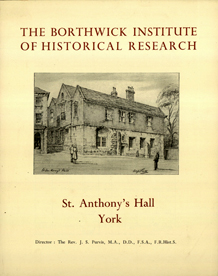Why are we called the 'Borthwick'?

Leaflet for Borthwick users, 1953
During 1949, while plans were being made to found an institute to house the Archbishop of York's archive and provide a base for researchers and scholars in York, it became clear that for this to be a long term venture permanent financing had to be found.
In early August 1949, Rev J.S. Purvis (the Archivist to the Archbishop and later to be Borthwick Director) heard, through his Bridlington contacts, that the executors of the late William Borthwick, formerly of Bridlington, were forming a Trust with the idea of putting the large sum of money he had left in their care towards some future, unspecified, educational work.
Purvis told Oliver Sheldon, who was busy putting all the arrangements for the institute in place. Sheldon opened negotiations with the Borthwick Trustees in 1949. The Trust money was finally acquired for the endowment of the Institute.
William Borthwick had died in 1946, so he had no personal connection with the Institute at all. He had made his money through a perfume business in Bridlington, and he later moved to Hertfordshire where he bought an estate which he farmed.
The key players in the story were the Borthwick Trustees. They were keen, however, that the money should permanently commemorate William Borthwick – so in 1953, instead of being named (as it certainly would have been) the York Institute of Historical Research, the new foundation was called ‘The Borthwick Institute of Historical Research’.
Although we are still called the 'Borthwick' we did in fact change our name in 2005. We were called 'The Borthwick Institute of Historical Research' in 1953 because this reflected our intended role in attracting academic researchers.
With the huge growth in the range of our archives since then, we decided after moving to our new building that 'The Borthwick Institute for Archives' not only better describes what we do today but also reflects that archives now have a wide ranging role and many users and contexts, and are not just the preserve of historians.

